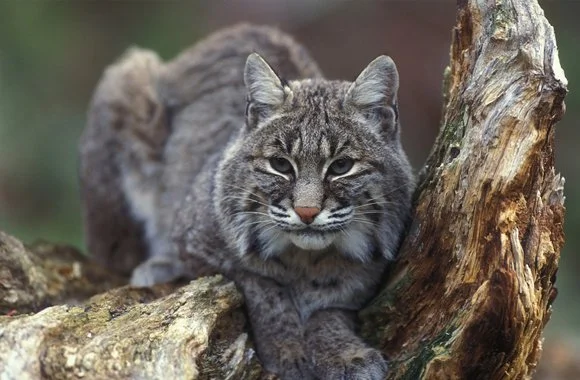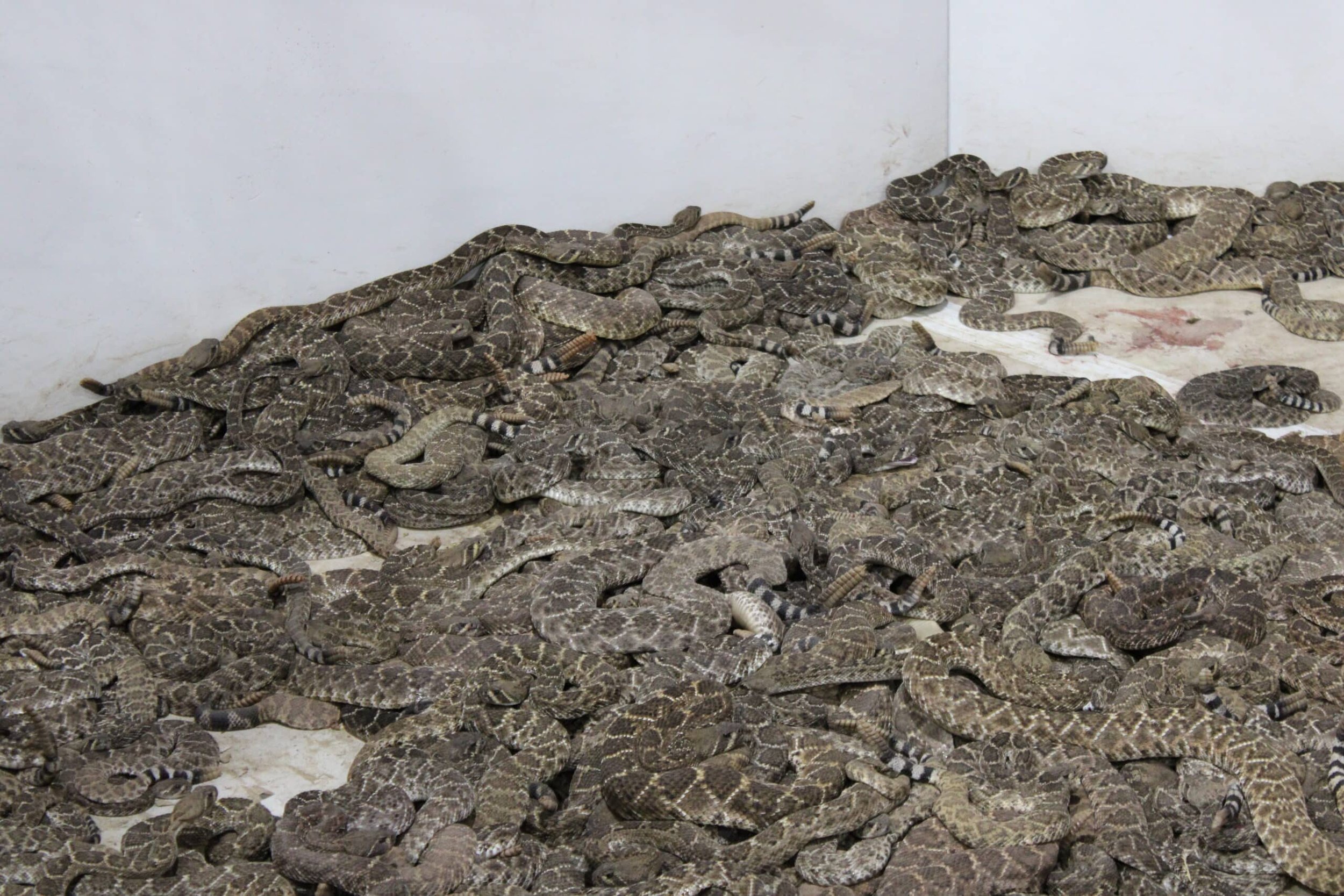Dark Reality of 'Thrill Killing' in the US Exposed in New Report
The investigative report by Born Free USA delves into the dark and unsettling origins of some of the most appalling hunting practices in existence, from killing contests to trophy hunting.
Credit: Born Free USA
A shocking new report released by the conservation non-profit Born Free USA has thrust the dark and disturbing world of animal "thrill killing" in the United States into the spotlight.
The investigative report, titled ‘Thrill Kill: Recreational Animal Slaughter in the U.S.’ uncovers the extreme cruelty prevalent in the industry, where thousands of animals are killed each year for sport.
"This new investigation lays bare the abject and deliberate cruelty inherent in these pastimes and the joy taken in torturing and killing living beings,” said Born Free USA CEO, Angela Grimes. “The animal suffering that we uncovered is on a scale that is difficult to comprehend and impossible to condone.”
The report reveals a range of practices, including the highly controversial killing contests, where hunters compete for huge cash prizes by killing as many animals as possible. One specific event highlighted is the 'Moondog Madness' competition held in Wisconsin. Participants pay a fee of $150 to engage in a 24-hour spree to kill as many coyotes as possible. In the initial round of the competition held in January 2023, organizers reported a count of 101 coyotes killed.
Photograph from “Moondog Madness” Facebook Page, January 2023
The nationwide scale of these contests is widespread, with at least 730 such events taking place in 2022 alone. The estimated death toll ranges between 18,000 and 110,000 animals, encompassing coyotes, foxes, bobcats, raccoons, squirrels, rabbits, groundhogs, porcupines, armadillos, opossums, beavers, cougars, and numerous other species.
“This is not about population management or predator control, this is killing for the fun of it, plain and simple, and it must be stopped," said Grimes.
Some hunting advocates also oppose the events for being vastly out of touch with public sentiment. In an interview, Eric Nuse, former Director of the International Hunter Education Association said: “We don’t like anything that smacks of commercialization with money or prizes. Anything that doesn’t honor the animals grates on us and seems inherently wrong. These contests create very poor PR for hunters.”
Although six states - Arizona, California, Colorado, Massachusetts, New Mexico, and Vermont - have already banned these contests, they remain legal in 42 states. However, several states where the practice is still legal are considering action against the killing contests.
Species Unite has also been rallying support to ban this cruelty in New York, where at least 29 wildlife killing contests take place each year.
Trophy Hunting
Within the United States, there is a growing trophy hunting industry that presents individuals with opportunities to stalk and kill African species without leaving the country.
In Texas alone there are an estimated 5,000 ranches that breed exotic species, with numbers of non-native species living there thought to be around two million individuals.
Among the targets for hunters are endangered species like the Scimitar-horned Oryx, once declared Extinct in the wild and currently undergoing a small reintroduction program in Chad. Hunters willing to pay between $2,950 and $17,500 can legally kill up to 75 of these oryx in Texas. Despite only 90 individuals existing in the wild, a single hunting ranch's website proudly displayed images of 41 dead oryx, representing nearly 50 percent of the world's entire free-living population.
This practice extends to other endangered species as well, including the Nile Lechwe antelope, classified as Endangered by the IUCN, with prices for hunting trophies reaching up to $15,000. Critically Endangered Dama gazelles, with fewer than 500 individuals remaining, can be slaughtered for around $10,000, while Pere David's deer, extinct in the wild, is available for killing at a price of $8,500.
In one video referenced by the report, hunters shoot a fallow deer – a deer species native to Europe and Asia – with a crossbow. The wounded animal then runs into a pond and as the animal drowns, the hunters can be gasping for breath between fits of laughter. The guide then dragged the deer out of the water by his antlers and the hunter posed for a photograph with the dead animal.
Texas – the epicenter of thrill killing
As exposed in the report, Texas has been branded the ‘epicenter of thrill killing in the US’, with 1,120,620 paid hunting licenses - the highest number across the country - issued in 2020, and around 50 killing contests staged per year.
Born Free USA warns that trophy hunting in Texas is an organized and expanding industry, backed by significant lobbying funds and government agency support. Alarmingly, organizations are actively advocating for the removal of certain species from protection under the Endangered Species Act, aiming to enable more animals to be hunted for financial gain.
Texas is also home to a number of other thrill-kill experiences, including ultra-violent hog hunting where hunters gun down dozens of feral hogs with fully automatic weapons while hanging out of helicopters. This practice is on the rise due to a 2011 rule explicitly allowing people to pay for the experience of killing from aircraft. In one video exposed in the report, a hunter can be heard saying: "I kinda [sic] blacked out and just started shooting… rounds off everywhere, I wasn't aiming for anything, I got so excited…"
Rattlesnake roundups, where snakes are tormented, killed, and skinned in front of paying audiences, is another prominent activity. The infamous Texas Rattlesnake Roundup attracts around 30,000 people each year, including children who are encouraged to cover their hands in the blood of rattlesnakes and put their bloody handprints on the wall, while other children are taught how to skin dead snakes as audience members watch.
“It’s about money. It’s become such a tradition, and it brings in a tremendous amount of money to the community,” said Michael Price, a herpetologist from the San Angelo area. “That’s my biggest issue; it’s not about population control, and it’s not about safety. It’s about money, and it is what it is.”
Thousands of snakes were piled on top of one another in one pit at the Texas Rattlesnake Roundup. Photo: Born Free USA
Take Action
In response to the report’s findings, Born Free USA is urging significant reforms, including bans on killing contests and other recreational animal slaughter, a reconfiguration of rattlesnake roundups into events promoting animal welfare and compassion for animals, and the relisting of commonly trophy-hunted endangered species under the Endangered Species Act. You can learn more about how to support their efforts here.
Please also join Species Unite in urging Jeffrey Dinowitz, the Chair of the Assembly Committee on Codes to support legislation to protect New York wildlife and end wildlife killing contests in the state.
We Have A Favor To Ask…
Species Unite amplifies well-researched solutions to some of the most abusive animal industries operating today.
At this crucial moment, with worldwide momentum for change building, it’s vital we share these animal-free solutions with the world - and we need your help.
We’re a nonprofit, and so to keep sharing these solutions, we’re relying on you - with your support, we can continue our essential work in growing a powerful community of animal advocates this year.
More stories:
Species Unite
A collection of stories of those who fight the good fight on behalf of animals.






A new UN report uncovers a staggering truth: the two unsustainably managed industries are causing costly harm to the planet.